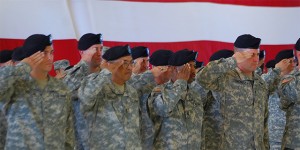Veterans aren’t being granted proper disability care
 The recent turmoil and bitter division left by the federal shutdown reverberated throughout the nation. We find battle lines drawn by anger-shaking hands on both sides over almost every domestic issue. Social media is almost unbearable in the midst of such crisis. Wannabe expert pundits squabble over issues in comment threads and blog posts as if the very fate of the Republic lay at stake. And in the middle of such crippling indecision and impotent rage, an unexpected group suddenly found itself threatened: U.S. military veterans.
The recent turmoil and bitter division left by the federal shutdown reverberated throughout the nation. We find battle lines drawn by anger-shaking hands on both sides over almost every domestic issue. Social media is almost unbearable in the midst of such crisis. Wannabe expert pundits squabble over issues in comment threads and blog posts as if the very fate of the Republic lay at stake. And in the middle of such crippling indecision and impotent rage, an unexpected group suddenly found itself threatened: U.S. military veterans.
On October 9, U.S. Department of Veteran Affairs secretary Eric Shinseki announced that if the government shutdown continued much longer, he would be unable to send out November disability checks to 3.8 million American veterans, and just under 500,000 surviving spouses or children. In all, nearly 6 billion dollars in payments to disabled veterans, surviving spouses, and children was shamefully put onto the chopping block, with all the world to see. This act, if it came to pass, would have had vast social and financial repercussions, and may have impacted civil peace. Luckily, this crisis, along with countless others, was narrowly averted in a midnight hour deal to keep the government running for a short amount of time.
Yet, what lies next for the veteran? Will every time our two political parties come to ideological blows over an issue, the failsafe in place to make sure millions of men and women who sweat and bled for our nation — sacrificing limbs, health, marriages, jobs, and sometimes their very sanity — be threatened? Will that 30-year-old National Guardsman who lost his arms in a dark, dirty, smoke-filled hell be able to feed his children next month, or make his rent payment when squabbling millionaire politicians draw a hard line to appease fanatical factions? What about that 21-year-old Marine who wakes thrashing, night after night, for years after returning safely home with a scream in his throat and utter panic seeping into his brain? What happens to him when that small check that keeps him in a warm bed at night suddenly is threatened? We saw exactly what happened after Vietnam — mass homelessness, unemployment, drug abuse, and indeed an entire generation of Americans needlessly lost. Not the ones who fell on the battlefield — their loss was still sharp and painful to our psyche — but to the generation who made it home just in time to see us turn our backs on them.
One of the benchmarks of any truly great society is how they treat the citizens who bled to protect that society when it wasn’t so great. Our grandfathers came home from WWII and Korea hailed as the greatest generation that has ever called itself American, and our country flourished. Those recently discharged heroes came home to a booming economy, plentiful jobs, and numerous opportunities to achieve the American dream. Our uncles went to Vietnam, and came home mocked and ashamed and angry. Funding for veterans’ care was almost non-existent, and the stigma of post-traumatic stress disorder still ran rampant. And our nation entered some of its darkest times. We, the public, learned our post-Vietnam lesson for the most part, however. Despite varying levels of popularity over the past decade regarding the wars in Iraq and Afghanistan, we as an American populace have rallied behind our fighting men and women. Now it is time for the government to do so as well.
Though the average age of a U.S. war veteran is still past 60, there are millions of Iraq and Afghanistan vets in society today. These are not the grandparents in high pants and sweet old man veteran hats at the grocery store that most think of when you say the word “veteran.” These are 20-somethings who grew up in the 90s and early 2000s. They watched SNICK and bought the first iPods and went to war with Facebook accounts. They made the choice to join the largest all-volunteer conflict in U.S. history, the earlier waves pushed by the horrors of 9/11, and later many sought the military as a chance to escape the cancer of recession that was rotting away at our economy. Whatever the reason for joining, they went. They went and did an unpopular, extremely difficult, and misunderstood job in a distant land. Now that they’re home, the hint that the benefits these warriors rely on to provide stability to themselves and their family as they recover and rehabilitate from the horrors of war are being threatened is beyond shameful. It is an utter breach of trust to those who placed their faith in their nation enough to put their lives on the line daily to ensure its survival.
It is a dark and trying time for our country. We are struggling to come to grips with our own waning strength and divisions. The next generation of Americans will inherit a nation struggling to break free of the 20th century and remain a superpower not just in size, strength, and numbers, but in national spirit. Never again must the security of our returning war fighters be called into question. Never again must we contemplate betraying those who have sacrificed so greatly.


